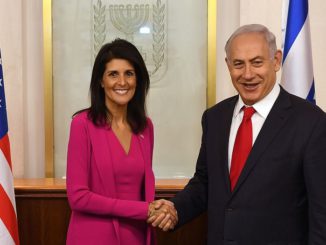
By Ramona Wadi
UN Special Rapporteur Michael Lynk’s criticism of the forthcoming US-Israeli annexation of more Palestinian land offers a good start to collective political action against Israel if only the international community would show that it is willing.
“The plan would crystallize a 21st-century apartheid, leaving in its wake the demise of the Palestinian’s right to self-determination. Legally, morally, politically, this is entirely unacceptable,” declared Lynk.
The UN official described the repercussions of annexation as creating “a cascade of bad human rights consequences” and insisted that the international community can no longer play its acquiescent role to Israeli violations. “The looming annexation is a political litmus test for the international community. This annexation will not be reversed through rebukes, nor will the 53-year-old occupation die of old age,” he warned.
This is not the first time that Lynk has offered a harsher criticism of Israel than the appeasing commentary which is typical of UN officials and institutions. In the past, he recommended international sanctions against Israel and supported the International Criminal Court (ICC) in its investigation of Israeli war crimes against the Palestinian people.
Lynk’s words draw attention to the UN’s political flaws and the endorsement of human rights violations committed by its member states. As Israel moves towards annexation, the international community is unlikely to assess its own complicity. The US-Israeli annexation plans are built upon decades of international endorsement of Zionist colonization.
To oppose annexation – one of the last steps that Israel is embarking upon to complete its colonial project – is not enough. Diluting settler-colonization to “53 years of occupation” is also inconsistent and a misrepresentation of the causes of Palestinian displacement.
The US may currently be playing a more prominent role, but the international community has magnified the US-Israeli relationship to deflect attention from the historical process leading to the current dynamic. The international community’s endorsement of the Israeli colonization project is a major violation that remains overlooked. What the US and Israel have achieved under the Trump administration is a reflection of an ongoing cycle of intentional political oblivion at a global level.
Having shone the spotlight on the US-Israeli collusion, the international community has availed itself of a temporary lull in scrutiny of its action, particularly its inaction when it comes to the Palestinian people’s political rights.
In truth, the international community’s action can be summed up in the 1947 Partition Plan, after which reliance on statements and condemnations became the diplomatically-accepted means of purportedly championing Palestinian rights. Lynk’s statements, albeit devoid of direct references to Israeli colonization, point towards international culpability.
In recent years, the two-state compromise remains the most blatant evidence of international culpability in preventing Palestinian reclamation of their land and rights. Just as annexation has been declared in violation of international law, the two-state diplomacy must also be held accountable for paving the way to annexation.
This necessitates a complete reversal of the politics that have sustained the UN so far. There cannot be a unified political front against Israel if two-state politics is not abandoned. Stopping annexation requires a reversal of Israeli colonization; anything less is an affirmation of treason against the Palestinian people.
– Ramona Wadi is a staff writer for Middle East Monitor, where this article was originally published. She contributed this article to the Palestine Chronicle.







